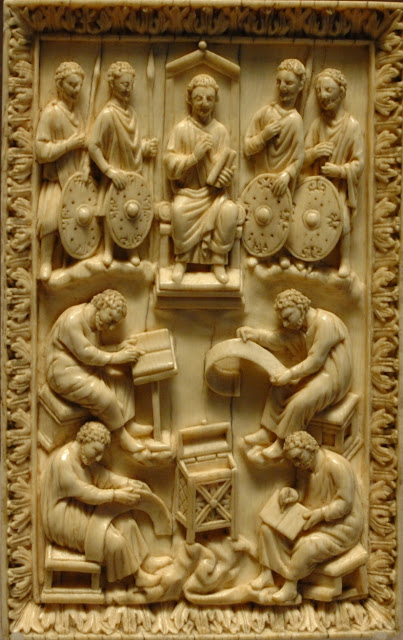 |
| David dictating the Psalms |
Recently my daughter Rose picked up a translation of St. Augustine's commentary on the first 50 psalms or so. My interest was piqued and I began thinking about reading through the psalms, along with a bunch of commentary — a very casual Bible study, in other words. And what better to do than to bring you all along for the ride?
There are a few psalms which I love, but in general I've not paid much attention to them. However, Athanasius's word below strike home. So I feel inspired to dive in deeper.
All the books of Scripture, both Old Testament and New, are inspired by God and useful for instruction (2 Tim 3:16), as it is written; but to those who really study it, the Psalter yields especial treasure. … Each of these books, you see, is like a garden which grows one special kind of fruit; by contrast, the Psalter is a garden which, besides its special fruit, grows also some those of all the rest.
And herein is yet another strange thing about the Psalms. In the other books of Scripture we read or hear the words of holy men as belonging only to those who spoke them, not at all as though they were our own … [however with] Psalms it is as though it were one’s own words that one read; and anyone who hears them is moved at heart, as though they voiced for him his deepest thoughts.
[T]he Psalms thus serve him who sings them as a mirror, wherein he sees himself and his own soul ...
Just as in a mirror, the movements of our own souls are reflected in them and the words are indeed our very own, given us to serve both as a reminder of our changes of condition and as a pattern and model for the amendment of our lives. ...
For I think that in the words of this book all human life is covered, with all its states and thoughts, and that nothing further can be found in Man.
Athanasius, Letter to Marcellinus on the Interpretation of the Psalms
Hebrew Poetry
Let's take a super quick look at the way Hebrew poetry works because that's what the psalms are, after all.
Hebrew poetry doesn’t rhyme. It uses parallels to reinforce thoughts and make impact with creative repetition. You thought free verse was something new? Nope, it’s from Mesopotamian times and probably even before then. They’re just the first ones who wrote their songs down.
There are different sorts of parallels but these are easy to pick up. I don’t love poetry and I don’t love free verse but I began to enjoy Hebrew poetry once I discovered those parallels.
The second line above, parallels the point of the first, but by repeating the thought in different words which enrich and beautify.My mouth shall speak words of wisdom,
my heart shall offer insights.Psalm 49:4A second method, of course, is to parallel by using contrasting or negative imagery to make the first point even stronger.
Last but not least is a method where the second part completes the thought from the first line.The wise heart turns to the right;
the foolish heart to the left.Ecclesiastes 10:2As the deer longs for streams of water,
so my soul longs for you, O God.Psalm 42:2Adapted from Thus Sayeth the Lord by Julie Davis
Sources
- The Book of Psalms: Translation with Commentary by Robert Alter
Hebrew scholar Robert Alter's translations routinely made the top ten list every time one was published. No translation and commentary I have read has so vividly brought alive scripture. The commentary is cultural and literary rather than religious, just fyi, but that simply enhances it for the reader who already has a religious grounding. - Psalms 1-50 (Ancient Christian Commentary on Scripture) edited by Craig A. Blaising, Carmen S. Hardin
A truly stunning commentary consisting solely of Church Fathers. There are more than sixty-five authors and over 160 works excerpted in this commentary, some of which appear for the first time in English here. - Psalms 51-150 (Ancient Christian Commentary on Scripture) edited by Quentin F. Wesselschmidt. Vol. 2 of the psalms for the series.
- Expositions of the Psalms 1-32 (Vol. I) (The Works of Saint Augustine)
The inspiration for beginning this whole thing! It's a combination of essays and sermons. I am more drawn to the sermons which are more casual, but we'll see what hits me as we go along. - Psalms Volume 1 (The NIV Application Commentary)
This series is so thorough about ancient sources, very even handed, and really good about providing a way for insights into modern life via ancient text. -
The Navarre Bible: The Psalms and The Song of Solomon
Great for the fact that they include so many comments from the Fathers of the Church, Catholic saints and popes and great thinkers, as well as including pertinent bits from the Catechism and other Church documents. - NIV Cultural Backgrounds Study Bible
Provides context on the customs and culture of the Hebrew people and the ancient peoples around them. This is based on history, archaeology, and literature of the ancient world. - Food for the SoulIn his inimitable style, Kreeft offers reflections on each of the Sunday Mass readings, excepting the psalms (which I wish he'd included). These amount to a series of mini-homilies on each reading and I like them a lot so far. My review is here.
- The Word of the Lord
Biblical scholar Dr. John Bergsma provides commentary on each Sunday's selection of readings. Whether you are a homilist seeking insight into the meaning of difficult scriptural passages or a Catholic desiring a deepened understanding of the readings you hear at Mass, The Word of the Lord series is an invaluable guide. My review is here.
No comments:
Post a Comment